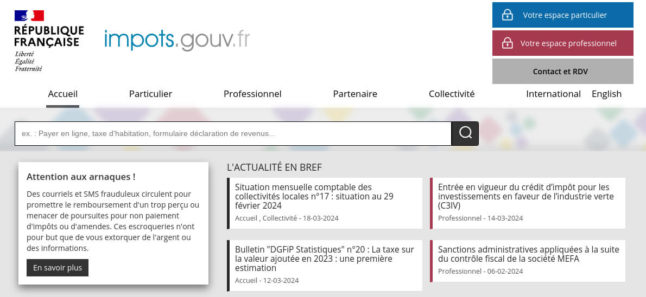With tax declarations now open in France, there are a few quirks to the French system that foreigners should be aware of, plus some nice tax breaks you may not have realised you could claim.
From filing for the first time to the latest on deadlines and tax breaks, here is our guide to the 2024 tax season;
2024 tax deadlines
Spring is the big tax season in France – it’s when the annual déclaration des revenus (income declaration) is done.
This form must be completed by everyone who lives in France – even if they have no income here or have already had their income taxed at source – as well as by people who have income in France (eg second-home owners who rent out their property). You can find full details on who needs to do the declaration HERE.
This year declarations opened on Thursday, April 11th and the deadline to have them completed is either May or June, depending on where you live. Full details HERE.
But spring isn’t the only tax time in France – if you own property here (whether you live there or use it as a second home) there are two other dates to keep in mind.
The first is the deadline for the déclaration d’occupation, which is June 30th (by 11.59pm). This declaration must be completed by everyone who owns property in France, including second-home owners who live in another country. However, this is not an annual task. If you completed it last year then you do not need to do so again unless your circumstances change. If you did not complete it last year, or you have bought a property in the last year, you will need to complete the declaration – full details on how to do that HERE.
Then in the autumn the property tax bills arrive – since the phasing out of the taxe d’habitation for everyone apart from second-home owners, property tax is now only paid by people who own property, tenants have nothing to pay. Find full details of what, when and how much you can expect your property tax bills to be HERE.
First-timers
If this is your first time declaring tax in France, then your first task is to request a tax number (numéro fiscal) and then create an account on the French tax website impots.gouv.fr – find a guide to doing that HERE.
The 2024 income tax declaration covers the 2023 tax year, which in France runs from January to December. Therefore if you moved to France after January 1st 2024, you will not have to complete the declaration until next year.
The property tax declaration concerns any property that you owned on January 1st 2024, even if you have since sold it.
Online v paper
Most people in France do their tax declarations online via the impots.gouv.fr website – it’s a good idea to use this if you can for the income tax declaration, since once you have done it once the form will ‘remember’ your answers, making subsequent years simpler and less time consuming.
In previous years people doing the income tax declaration for the first time were required to do it on paper – this year tax authorities say first-time declarations can be done online too.
Income tax and property tax declarations are described as ‘online only’ procedures, but there is provision for people who don’t have internet access or you are not comfortable completing online tasks – in this case you can visit or call your local tax office and request paper versions of the forms.
2024 income tax brackets
If you are earning money in France, whether that is as an employee, self-employed or you are getting income from property rentals, you will be expected to pay income tax.
There have been some changes to the income tax brackets for 2024. The new income tax brackets for 2024 are;
- Up to €11,294 – 0
- Between €11,294 and €28,797 – 11 percent
- €28,797 to €82,342 – 30 percent
- €82,342 to €177,106 – 41 percent
- More than €177,106 – 45 percent.
Like most countries, French taxes are progressive so if you are a higher earner, you would only pay the 45 percent tax rate on the portion of your income that is over €177,106.
Changes for 2024
There are a couple of changes to the 2024 form, including an extra compulsory questionnaire at the end. There are also changes to the rules for people who include adult children on their declaration plus a new service on the app – find full details on the changes HERE.
Social charges
Deductions in France are split into two categories – impôts (income tax) and prélèvements sociaux (social charges) – the latter encompasses things like pension contributions but also deductions to cover healthcare charges, unemployment benefits, sick leave or maternity leave. They’re broadly similar to National Insurance contributions in the UK.
Exactly how much you are charged depends on your income and other factors such as your pension regime, but for most people the social charges will easily exceed the income tax deductions, often social charges are two or three times higher than income tax.
One common charge is related to healthcare – the CSM – which is most often levied on early-retirees. More information on who might be liable for this expense can be found our guide.
READ ALSO How much tax can I expect to pay in 2024?
Tax breaks
It’s not all bad news, there are plenty of things that you can claim tax deductions or tax credit on – from opening up a French retirement account to employing a cleaner, giving money to charity or using your car for work.
You can find an updated list of the most common tax breaks HERE.
Tax for foreigners
The French tax system has several unique quirks that often catch out foreigners in France.
Among the most common are not realising that you have to complete the annual income tax declaration and failing to declare non-French bank accounts (even if they are empty or dormant).
READ ALSO 10 common tax traps for foreigners in France
Americans living in France have their own particular set of tax challenges, which are to do with the way the French system interacts with the IRS.
READ ALSO Tax traps that Americans in France should avoid
Foreign income
It’s not unusual for foreigners in France to have some or all of their income coming from outside France – whether that is a pension paid from an overseas country, remote working for a non-French company or rental income from a property outside France.
One key thing to realise about the French tax declaration is that it is asking for details of all your global income, not just income in France.
If your country has a tax treaty in place with France (which most countries do) you won’t pay tax twice on the same income, but you still need to declare it in France.
READ ALSO What do I need to tell the French taxman about my assets outside France?
All income must be declared in euros – unlike the US there is no set formula for converting income in pounds/ dollars / other currency into euros.
Reader question: How do I convert my income into euros for the French tax declaration?
Tax for second-home owners
If you live outside France but you own property here which you use as a second-home or holiday home then there are a few things to be aware of.
The first is whether you are a ‘tax resident’ of France – if you use your French property just for holidays then you probably won’t be, but the French tax system begins to consider you tax resident if you spend at least six months of the year here, so this can affect certain second-home owners who spend a significant amount of time in their French property.
The other thing to consider is whether you have any French income through renting out your property, including on Airbnb – if you do, then you will need to declare this income in France.
Find full details of tax residency rules HERE.
And finally, even if you are not tax resident and don’t have to complete the annual income tax declaration, you will have to complete the one-off property tax declaration (déclaration d’occupation) if you have not already. Full details HERE.
Getting help
If you’re completely daunted by the French system then don’t panic – help is available.
From online guides to help at the tax office to finding an English-speaking accountant, here is how to get help with your French taxes.
If you have further questions on French taxes, you can visit our FAQs section HERE, or our French taxes section HERE. If you can’t find the answer you are looking for, feel free to leave your question in the comments section below or email us [email protected] and we will do our best to answer it for you.



 Please whitelist us to continue reading.
Please whitelist us to continue reading.
Could you please answer this question:
I am a British citizen and I live in England and pay taxes to the HMRC.
I spend less than 6 months a year in France in my second home.
I have recently opened a LIVRET A bank account with a French bank. This is accessible to non-residents and the interest is paid tax-free.
My question is: Do I have to declare the interest gained on this account to HMRC on my tax return or is it also tax-free for the Brits?
Thank you
I have a U.K. credit card. Should that be declared as a foreign bank account on French tax return.